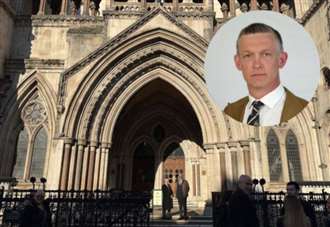-
 play_arrow
play_arrow
Kl 1 Radio Local radio for west Norfolk
-
 play_arrow
play_arrow
KL DISCO KL Disco Playing Disco Music from the 70's onwards.24/7
-
 play_arrow
play_arrow
KL COUNTRY KL COUNTRY Playing New and Classic Country Music 24/7
-
 play_arrow
play_arrow
KL ROX KL ROX The best of New and Classic Rock.24/7
-
 play_arrow
play_arrow
KL SUMMER Summer Vibes 24/7 from KL1 Radio across West Norfolk
-
 play_arrow
play_arrow
KL CLASSICAL Your Symphony Starts Here
-
 play_arrow
play_arrow
KL CHILL Just Chill!
-
 play_arrow
play_arrow
KL POP The Best POP Hits all day Long!
-
 play_arrow
play_arrow
KL XTRA KL XTRA
music_note

He was once blocked from making protestations against his own council after being branded a “persistent complainer”.But after refusing to back down, West Norfolk councillor Simon Nash’s ten-year feud with officers has now led to a high court battle – running up thousands of pounds in legal costs in the process.He took the authority to task over its handling of a standards hearing conducted last year, which he claimed was conducted unlawfully by breaching his right to a fair trial. He called it an “orchestrated kangaroo court”.
This followed an ongoing row with officials that began in 2015, four years before he was elected, spurred by frustrations at how the council had treated his mechanics business.His feud with West Norfolk Council has culminated in two high court cases after Mr Nash called for a judicial review of his conduct hearing, which have been blocked.But he believes the judge’s ruling has proved wrongdoing and is claiming it as a victory for his cause after the council failed to win a claim for Mr Nash to pay part of its £14,000 legal costs.
Hearing hampered Mr Nash, who stands as an Independent representing Setchey Ward, got into trouble over dozens of emails he sent to officers and councillors.He says these emails relate to 22 “whistleblowing” complaints over the running of the council, in which he compared the authority to a “dictatorship” and also accused officers of “corruption, fraud, collusion or gross incompetence”. This included a complaint that the Monitoring Officer has refused to investigate any of Mr Nash’s allegations of “unconstitutional behaviour” by officers and fellow councillors.The council has not upheld any of his complaints, which were dismissed without formal interviews being conducted, Mr Nash said.He became the focus of a grievance himself for breaching the council code of conduct. This led to a standards hearing last year, held in January, during which the panel of councillors ruled that he had broken the council’s rules of behaviour and was told to apologise.However, at the start of the hearing, the committee denied him being allowed a Mckenzie Friend – an individual providing moral support to a defendant.He says this broke Article 6 of the Human Rights Act – the right to a fair trial – and that the help would have been vital to navigate 2,000 pages of supporting evidence he had prepared.Other complaints include the lack of training conducted by the councillors on the committee. WNC dismissed this, saying council conduct hearings have different rules to formal court proceedings and they do not have to abide by this Act.It was this sticking point that became the focus of Mr Nash’s calls for a judicial review.But it was a decade ago when the bad blood began developing.‘Persistent complainer’ His vendetta against the authority started in 2015, four years before he was elected.It began after his garage lost a contract with the council for testing taxis when a cab driver was given penalty points for allowing his licenced vehicle to be driven by a mechanic.He proceeded to protest the decision and was put on a “persistent complainer” list after sending more than 50 emails to the council in a 10-month period.This led to his messages being blocked – an act he describes as a “gagging order”. Frustrations over his treatment spurred him to stand for election in 2019 in order to “hold the council to account” as an elected member.High Court battleMr Nash decided to seek permission from the High Court for a judicial review in April, claiming it breached his human rights to a fair trial by not being allowed a Mckenzie Friend.Mckenzie Friends are allowed if a defendant is representing themselves and can provide moral support, take notes and help with case papers. But they cannot address the court or examine witnesses. He sought a High Court resolution after being told he was unable to lodge a complaint against the council through the Local Government Ombudsman as he was a serving councillor.In a letter to the High Court, submitted as part of his calls for a judicial review, Mr Nash demanded an apology for how the hearing was held.However, Judge Hugh Mercer KC, refused his request. He instead ordered Mr Nash to pay £4,250 to cover WNC’s legal fees, finding that Article 6 did not apply to a hearing of this kind.But Mr Nash was not done. He applied for the case to be reconsidered, which led to a further high court hearing at the end of last year.Final rulingIn the subsequent court case, the councillor again was denied a judicial review but the judge took a different view over whether Article 6 should have applied.At the time of Mr Nash’s hearing, WNC’s constitution stated that any hearings conducted by the authority should abide by the rules set out in the Human Rights Act. Judge Matthew Butt KC, who presided over the case, therefore concluded that as this was written in the constitution, the procedures of the hearing should have followed this.It was also revealed that WNC’s lawyers had presented the wrong guidance during the first High Court hearing, which has since been changed to no longer state that Article 6 rules would apply to standards hearings.In court transcripts, Judge Butt said: “The judge refusing permission relied on what you said about the terms of the guidance, did he not? … Permission was refused in part on that basis … that is quite a serious matter.”He later said the council appeared to have “misled” the judge in the first case but said there was no suggestion of an “improper cover-up or bad faith”.This omission eventually led the judge to say he “understood” why Mr Nash was unhappy with the hearing and that there was a “disconnect” between local government guidance and the council’s own constitution.Judge Butt went on to rule that Mr Nash’s rights to a fair trial had not been breached but he did overturn the council’s request that Mr Nash pay part of its legal fees prompted by his High Court challenge.WNC has said the saga has cost them £14,000 while Mr Nash says the court cases have cost him £1,000.Following the decision, a spokesman for WNC said: “This has now been refused on two separate occasions, with the court finding no fault with the standards procedure followed. We thank the High Court for its independent assessment of this matter and welcome its decision.”However, Mr Nash believes he has been vindicated.He said: “The hearing was disgraceful. The mistakes made were to the benefit of the council but to my detriment. The hearing appears to have been nothing less than an orchestrated kangaroo court.”However, he hopes he can put his troubles behind him and hopes he can work positively with WNC’s new chief executive and senior officers.He added: “Their attitude is a great step forward, they have been really engaging and interested.”
Similar posts
Upcoming shows

Darren Furzey – Classic Hit Weekend
1:00 pm - 3:00 pm

John Atkins – Sunday 60’s and 70’s
3:00 pm - 6:00 pm

Frank Hopping – Real Music Society
6:00 pm - 8:00 pm

Mike Bentley – The Theatre Show
8:00 pm - 10:00 pm

Jonathan Charles – Vinyl Countdown
10:00 pm - 11:00 pm
-

From food to footie: Tackle the ultimate England quiz

NHS boards pay 227m compensation in five years figures suggest

Number of modern languages teachers down by more than a fifth figures suggest

Free breakfast clubs to open at 750 schools as teachers voice funding fears

49-year-old threatened to put his penis in train station staff member’s mouth
Message Us
Copyright The Mediasite UK - 2025



